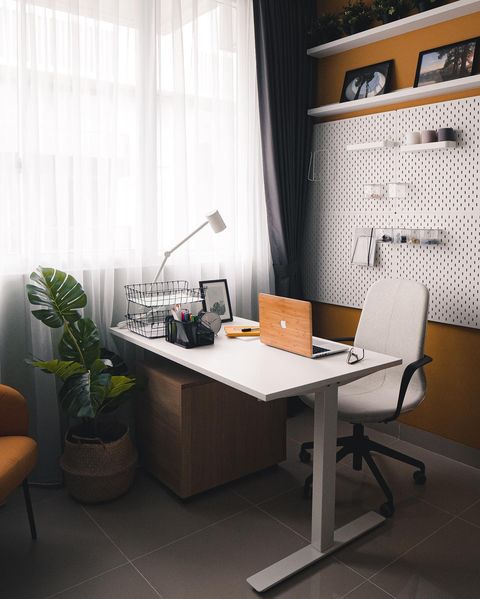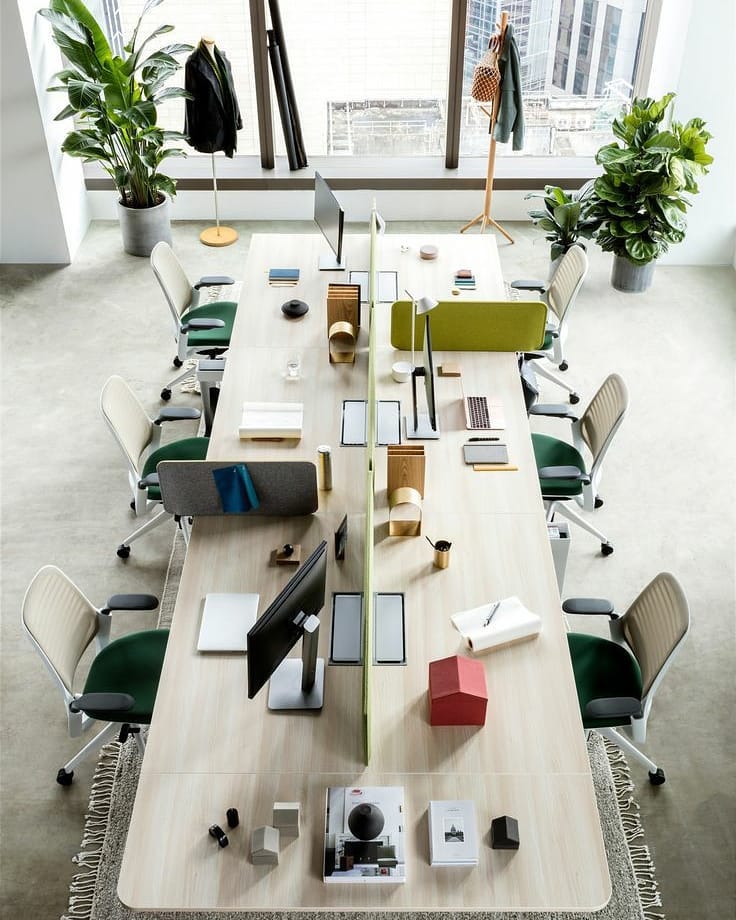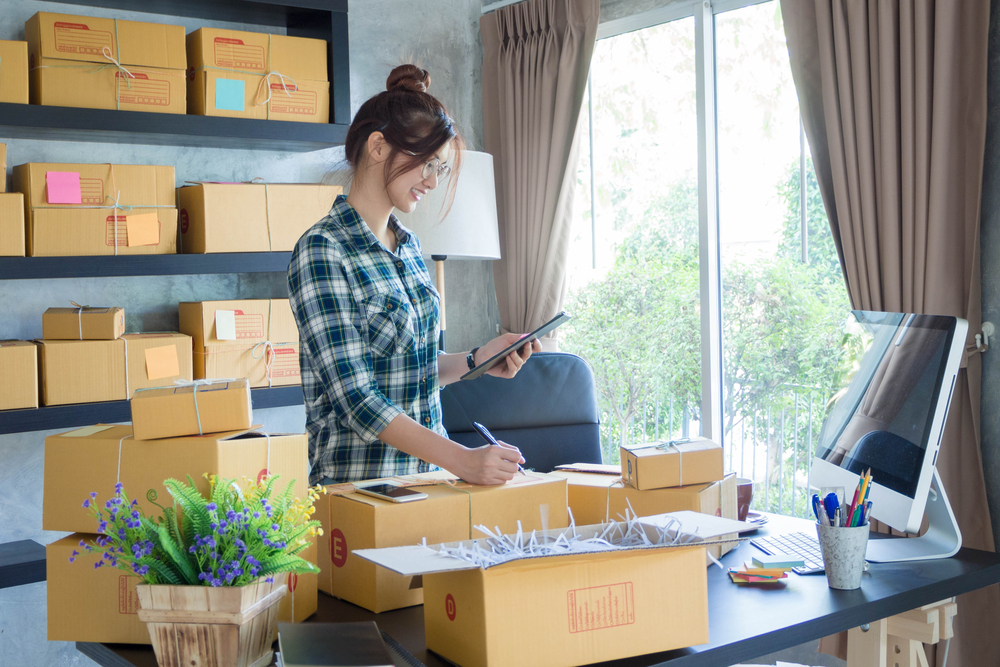Starting your own small business? Traditionally, people have worked in a separate office outside the home, but working from a home office has become an increasingly popular option. Explore the benefits and drawbacks of a home office vs. a traditional office below!
- Benefits of a Home Office
- Drawbacks of a Home Office
- Benefits of a Traditional Office
- Drawbacks of a Traditional Office
Benefits of a Home Office

Photo via @mrvahn
If you have a small business with limited start-up funds and your work can be conducted remotely, setting up a home office is a cheaper alternative to commuting to a traditional office. Here are benefits to establishing a home-based business.
No Commute
The average American spends around 27 minutes on their daily commute to work—that’s almost an hour both ways. That commute can eat into your time, money, and sleep schedule. By working from a home office, you can not only potentially save thousands of dollars a year, but you can get more rest and spend more time preparing for your work day. Without the stress of rush-hour traffic, your mornings can begin on a more peaceful and productive note.
Fewer Business Expenses
As the average cost to rent office space per square foot is between $8 and $23, renting office space can be expensive. Small businesses often don’t have enough start-up capital to afford that expense. If you operate from a home office, the cost of rent is eliminated and you won’t have to stock an entire office building with supplies. Using equipment that you already own for your home office, like a computer and home filing system, can further reduce your business expenditures.
Potential Tax Benefits
Working from a home office may entitle you as a homeowner or renter to deduct some of your home’s expenses from your taxes, including property taxes, home maintenance costs, utility bills, and more. So long as you keep detailed records of your spending and meet the IRS requirements for the home office tax deduction on Form 8829, taking that deduction means you could save money every year.
Increases Productivity
76% of employees say they avoid the office when they need to focus on work. Home offices tend to be quieter, and they make it more difficult to be distracted by coworkers. Combined with removing the stress of a daily commute, it’s not hard to understand why remote workers tend to be 13% more productive than their office-bound counterparts.
More Control Over Your Schedule
Running your small business at home gives you more control over your schedule so you can work when you’re most productive! Some people work best first thing in the morning, while others thrive in the evening. Working from home can also help people maintain a work-life balance, enabling parents to save money on childcare while working from home.
Flexible with Weather
In a traditional office, building closures due to inclement weather and employees being out of the office for long periods can slow productivity. Nowadays, there are plenty of digital resources that allow employees to continue working from home when coming to the office isn’t feasible. Remote working platforms and business communication apps like Slack, Microsoft Teams, Asana, and Google Drive make working remotely easier than ever.
Drawbacks of a Home Office
While many benefits are balanced out with drawbacks, it’s still important to consider the cons to working in a home office and how that can affect you and your small business.
You Need a Dedicated Work Space
Many small business owners who work from home choose to repurpose a spare room into a home office, creating a distraction-free place to work. Having a designated space for work at home can help create some separation between work and home life. However, not everyone will have enough room in their house to convert into a home office—and using shared spaces can distract you and limit your productivity and focus.
Maintaining Work-Life Balance Can Be Difficult
Though working from a home office can eliminate distractions you’d face in a traditional office environment, it can take a lot of self-discipline to shut out potential home distractions—like chores, personal phone calls, pets, family, and more. If you don’t have the willpower to create and stick to a firm work schedule, you may find your productivity slipping, ultimately disrupting your work-life balance.
You Need Licenses & Permits
Depending on your home business’s function and location, you’ll be required to apply for a range of permits and licenses for small businesses to keep yours legally compliant. Additionally, you may need to consult with your landlord, homeowners association, or municipality about any restrictions, prohibitions, or zoning regulations against operating a home business. Navigating these legal issues can be a headache, and failing to file the correct paperwork or comply with your HOA or lease’s business stipulations could land you in hot water.
Communication Can Be Tricky
The continued development of video conferencing software and business apps makes it easier to stay in touch from a distance, but there’s no replacing face-to-face communication. Without non-verbal cues, messages can get lost in translation over email or text—research shows that face-to-face requests are 34 times more effective than those sent by email. Plus, video conferencing technology can face technical issues, which can cause you to waste time trying to identify and fix the problem. Around 50% of employees who have both in-person and online meetings prefer in-person meetings.
More Likely to Need More Space
When confined to a home office, you may not have room for additional equipment, inventory, or important paperwork so you may have to rent a storage unit for your business. While there are workable solutions, traditional offices typically have additional storage space that’s closer and more convenient to access.
You Might Miss Out on Walk-In Traffic & Talent
For retail businesses in particular, working from home means you won’t get the business of potential customers who decide to stop in while walking by. In that case, you’ll have to dedicate more time and resources to social media and online marketing to ensure your business is on customers’ radar. Similarly, you’ll have to make sure that prospective employees can find your job postings since they won’t have a physical building to associate you with.
Loneliness Can Affect Productivity
A consequence of working from a home office may be feelings of loneliness. This can be difficult, especially for extroverted people who thrive off social interaction. Spending long work hours alone without much human interaction can impact your creativity and productivity, as well as contribute to employee burnout. If you work from home and have employees, it’s important to maintain a sense of team connection and morale.
Benefits of a Traditional Office

Photo via @unicorn_ix_
Whether you lease commercial office space or opt for a more middle-ground solution like a coworking office, it can be beneficial to have a separate office for your business. Here are excellent reasons why small businesses opt for a brick-and-mortar office.
Your Business Has a Professional Space
Having a public-facing professional workplace can provide your small business with a better first impression for customers, clients, and investors. Additionally, a physical workplace may be viewed as more legitimate to prospective employees, as well as provide extra space for staff meetings, collaborating on business plans, giving presentations, and more.
There’s Room to Expand
Ideally, your small business will be successful and continue to expand, which means you’ll eventually require more space to manage your growing inventory, equipment, and employees. If you start your business from a home office, you may one day realize that you’ve simply outgrown your available space at home. It’s easier to grow in a traditional office (or move into a larger one) than it is to carve out more room in your home.
It Allows You to Build Community
No matter how far technology has progressed, it can’t replicate the benefits of face-to-face interaction. Whether it’s with your employees, clients, partners, or investors, talking in person provides clearer communication, encourages creativity, and can help build meaningful business relationships. Plus, being with your coworkers in person allows you to build social capital, which is harder to achieve in an online environment.
Communication Is Simpler
When you work in a traditional office environment, checking in with employees is as simple as walking over to them for a quick discussion—you can have casual conversations throughout the day and monitor their progress on certain tasks in real-time. You don’t have to wait for them to respond to a text, email, or direct message like you might in a remote setting.
They Allow You to Separate Work & Home
Studies show that 25% of remote workers say their biggest challenge is unplugging after work. When there’s no physical separation between work and home, it’s difficult to ever feel like you’re truly “off the clock.” Having an office space helps create a clear division between work life and home life. This allows you to unwind after work and mentally prepare beforehand, which can ultimately contribute to a healthy work-life balance.
Drawbacks of a Traditional Office
Round out your understanding of how a traditional office can help your small business by learning more about the drawbacks below.
Traditional Offices Are More Expensive
Not only is there the cost of your office lease and rent payments, but you also must factor in the cost of supplies, furniture, and equipment to fill the space. On top of that, you’ll have to manage office utilities like phone lines, WiFi, heating and air conditioning, security, and more. Those expenses add up quickly, and many small businesses may not yet be mature enough to take them all on.
You’re Locked in a Fixed Term Lease
While some commercial leases are flexible, signing a rigid lease could lock you into a space that doesn’t suit your needs. Your business might grow more quickly than your existing space allows, forcing you and your team to operate in a cramped office space. On the flip side, you might not need as much space as you originally thought, but now find yourself stuck paying more rent than you have to. Additionally, if your business closes down, those leases won’t end, so you’ll be paying for something you no longer need.
Commutes Take Up Valuable Time
The average person spends roughly 4.35 hours per week on their daily commute to work, meaning that they lose over 100 hours each year. That daily commute can be stressful, especially in metropolitan areas with heavy traffic, causing you or your employees to show up to work already stressed out from traveling.
Office Buildings Still Have Distractions
In a traditional office, conversations, breaks, and lunch trips can all take lots of time from a day and potentially sap workplace productivity. Studies show that remote workers actually spend more time on the clock than traditional office workers, with 62% of workers reporting they feel more productive when working remotely.
It’s Harder to Balance Personal Responsibilities
You can’t care for a sick child, schedule an appointment for home maintenance, or accept packages when you’re at a traditional office. When working from home, you can take care of these tasks throughout the day, and they don’t require you to take a half-day from the office or use up valuable PTO.
***
Need a place to store inventory, supplies, or equipment while you’re getting your small business up and running? With convenient self storage locations all across the country, Extra Space Storage is your ideal small business storage partner. Rent local storage units now!





